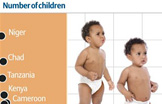Africa's population predictions raise the prospects of an economic upturn. In soccer, African hopes will be pinned in the coming weeks on the African teams competing in the World Cup: South Africa, Algeria, Ivory Coast, Ghana, Cameroon and Nigeria. These same countries also serve as prime examples of the challenges facing the African continent as well as the opportunities opening up for them. "From a demographic point of view, African countries will have a historical opportunity in the coming years to defeat poverty – provided that the right actions are taken," said Michael Heise, Chief Economist and head of Corporate Development of Allianz, summing up the results of the latest Allianz Demographic Pulse.
Africa: Out of poverty with clever women
Downloads

Heterogeneous Africa
The six African countries competing in the World Cup are among the most populous states in Africa. However, they differ immensely in size: Nigeria's population of around 158 million is over three times larger than the host country South Africa, which according to the last census has just under 50 million inhabitants. But in other respects, too, the African continent is characterized by huge differences between the countries in the north and south on the one hand and the central African countries on the other, especially with regard to birth rates, prosperity and education.
Prosperity versus children
The following correlation exists between the prosperity of the various African countries and their birth rates: the higher the gross domestic product per capita, the lower the average birth rate. Whereas most African countries with a gross domestic product of less than 1000 US-dollars per capita have birth rates of over five children per woman, in the wealthier northern and southern African countries such as Egypt, Algeria, Morocco, Botswana and South Africa, it is less than three children. The relationship between birth rates and prosperity does not apply only to developing countries.We find the same relationship when we compare GDP per capita and birth rates of countries worldwide – but even more sharply defined. The wealthiest countries in the world such as Switzerland, Germany and Japan also have the lowest birth rates.
There is a clear causal relationship between prosperity and birth rates. Birth rates often track economic development with a time lag.

Education for women is the key
Because child care remains the domain of women in most countries, higher education levels mean lower birth rates. Women in African countries with a high literacy rate tend to have fewer children than their counterparts in countries where the literacy rate among women is lower. For example, in South Africa, where around 90 percent of women can read and write, the birth rate is 2.5 children per woman, whereas in Chad, where around 80 percent of women are illiterate, it is 6.3 children per woman.
"In recent years most African countries have increasingly invested in the education of girls and young women. A case in point is Nigeria, a country in which the illiteracy rate is 71.5 percent among men but 48.8 percent among women. Nigeria has meanwhile placed more emphasis on the education of girls with the declared aim of lowering the birth rate by at least 0.6 children perwoman every five years," says Heise. In view of these encouraging developments, the UN, among others, assumes that the downward trend of birth rates in Africa is set to continue.
Economic recovery – benefit from the "demographic dividend"
From a demographic point of view the stage is certainly set for an economic recovery, especially in the north and south of the continent. In the coming years Africa will have a unique opportunity to defeat poverty. The consequence of falling birth rates in a society with a tradition of many children per woman is that in the following decades the proportion of people in gainful employment in the population will increase. As a result, the "productive segment" of society will have to care for significantly fewer economic dependents, i.e. children and the elderly. In this context Allianz Demographic Pulse speaks of a "demographic dividend". Of course this will require more political stability and further progress along the path of economic reform.
As Heise points out: "The Western nations have every reason to put their full weight behind these efforts: A prospering Africa can very much help to offset the effects of an aging society on the global scale. It is in our own interest to devote our full attention to Africa, not only when it is hosting the World Cup."
As with all content published on this site, these statements are subject to our Forward Looking Statement disclaimer.
Link to the disclaimer